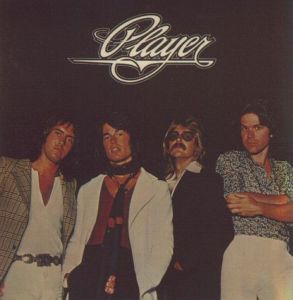
- Format: LP

Player is a pop/rock band that first formed in Los Angeles in the late 1970s. The original band consisted of Peter Beckett on lead guitar and vocals, J.C. Crowley on keyboards and vocals, Ronn Moss on bass guitar and vocals, and John Friesan on drums. After playing clubs and bars for some time, they finally managed to get a record deal with RSO Records.
Their first album, Player, was released in 1977. It featured the smash hit "Baby Come Back," which earned them worldwide recognition and several awards.
The second album, Danger Zone, was less successful, but still brought about the hits "Silver Lining" and "Love In The Danger Zone." J.C. Crowley then left the band to become a country music solo artist.
Player then signed to Casablanca Records, and released their third album, Room With A View. This album had a hard rock edge, and featured the hit title track, "All Tied Up," and "It's For You." Then Ronn Moss left the band to pursue an acting career.
Beckett and Friesan were the only ones left to complete Spies Of Life, released in 1982 on RCA Records. Player disbanded after that, and Beckett spent most of the 1980s writing for other artists. He did release one solo album, and a greatest hits compilation of Player's music came out in 1990.
Peter Beckett and Ronn Moss reunited in 1995, and released a new album in Japan, called "Electric Shadow." This album was released in the U.S. a year later, and was called Lost In Reality. It was official, Player was back, but with only two of the four original members. Today, Player is at work on a new album, wich should be released sometime in 1998.
"Baby Come Back" is one of those classic one-hit wonders of the '70s; the kind of breezy song that easily found its way to number one, and remained in the public consciousness for years later. It's the kind of song most listeners know when they hear it, yet they're not sure who it is — and, if they do know who it is, chances are, that's all they know. They know that Player is responsible for that song, and that's it. Few people realize that Player had another Top Ten hit with "This Time I'm in It for Love," or that both of their first two albums — 1977's Player and 1978's Danger Zone — reached the Top 40 and went gold. They had more success than most one-hit wonders, and it was deserved, since they epitomized what mainstream soft pop/rock was all about in the late '70s — and that was the sound of Los Angeles. "Baby Come Back" sat atop the pop singles chart for three weeks in early 1978. Later that year, Player was released, and it followed through on the promise of "Baby Come Back," particularly on "This Time I'm in It for Love," but also with its abundant offering of mellow keyboards, layered harmonies, and spacious production. This was laid-back but engaging, and the band displayed some serious musical chops, occasionally sounding like a sweet, streamlined Steely Dan.